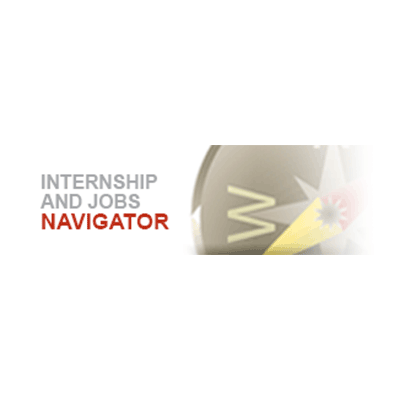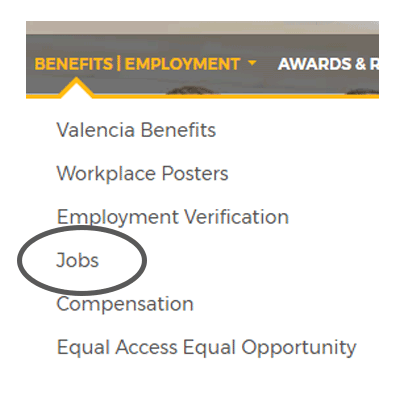Job Search Strategies
Job Fairs
Job fairs, or career fairs/career expos, are large events in which employers, recruiters, and schools give information to potential employees.
For career-related events, including upcoming job fairs, visit the Valencia Calendar or contact Internship and Workforce Services.
A career fair is a great way for students to meet prospective employers and ultimately land a job. Learn how to prepare and talk with employers.
Great advice on how to introduce yourself to potential employers
Before you approach an employer at a career fair, prepare a one-minute commercial about yourself.
- Who you are (name, major, relevant interests)
- What you offer (skills, experience)
- What you are looking for (this is a good opportunity to show your interest in a specific area of the company)
- A good follow-up question
EXAMPLE:
Hello, my name is Joe/Jane Student. I am majoring in hospitality at Valencia College.
I noticed on your website that there are some opportunities in front desk operations
that I am interested in pursuing (Hand them a copy of your resume). You will note
that (mention something that ties your skills/experience/qualifications to the position/internship
criteria). I am very interested in (name the company) and I would like to know your
steps in selecting candidates for interviews.
Other things to consider:
- Maintain eye contact, smile, present a firm handshake, and introduce yourself.
- Clearly state the interests, skills, and knowledge you can bring to the organization.
- Answer the question “Why would a recruiter be interested in you?”
- Practice your elevator speech until you can say it with confidence.
Ways to Gather Information About a Job (Prior to Attending a Job Fair)
Informational Interview
Explore and learn about different careers and make contacts by talking to people who
are already working in the fields you are curious about.
Need help finding someone to interview?
Start by checking in with your network - this includes your professors, student success
coaches, colleagues, classmates, family, and friends. You never know where you may
find a connection.
An informational interview is an opportunity for you to learn directly from professionals about their experience in a specific career.

Job Shadowing
Observe or “shadow” a professional who has specific knowledge about an occupation
or career in which you are interested.
When you are looking for a job shadowing experience, engage with your network and see if there is someone in your field with time to host you for the day. Your goal is to observe a real “day-in-the-life” of that professional, so find someone who is in the job you want.
Learn about responsibilities and tasks associated with the career and ask questions about the knowledge, skills, talents, and level of education required for the job. In addition to gathering career related information and expanding your networking contacts, you will also build your interviewing skills, become aware of trends in the field, and see workforce technologies in action.
Preparation:
- Show up on time
- Dress appropriately
- Bring paper and pen
- Make note of the names of people you speak with
- Be prepared to make a good impression
- Follow up the experience with a “thank you” note to the professional
Getting Experience
On-campus Involvement (Student Development)
Getting involved in events, activities, and organizations outside of class is a key
to your future success! Student Development partners with the college's academic curriculum
to provide experiences that lead to your growth and development.
Volunteering allows you to gain relevant skills in a field or build a relationship with an organization. It can also help you to identify areas where you are naturally talented, inclined, or passionate.
Valencia Volunteers is a volunteer referral resource available to students. This group can refer students to agencies and volunteer projects that best fit their needs and interests. Valencia Volunteers works with clubs and organizations, staff, faculty and over 200 community agencies.
Internships
Internships are work experiences that can be completed for college credit and allow
you to gain relevant experience in a field. This is a great way to learn more about
the work environment and job responsibilities of a particular career field. The Internship
and Workforce Services team can help you get started.
Part-Time Job
A part-time job is a job that requires you to work fewer than 30-hours per week. Ideally,
try to find a job related to your field. For example, if you are interested in hospitality,
try to find part-time work in a hotel or restaurant.
- Search for jobs at Valencia on the Valencia Employment website.
- Valencia students who are eligible for work-study can also search for jobs online.
- Students looking to enter the workforce in a part-time job can check Navigator for open positions.
Networking
What is networking and why is it important?
Networking is about building relationships. Networking is a way to gain valuable information,
progress professionally and help others. Many of your contacts can often become your
friends and colleagues as you progress through your career.
No matter the industry, networking is essential to a long, successful career. Get tips on how to prepare and follow-up!
Most employers tend to fill positions by contacting people they know and through word of mouth. According to the US Department of Labor, 80% of job vacancies are never posted publicly. So, to improve your chances of finding a job, it is essential to expand and maintain your network.
Identifying Your Network
Everyone everywhere has the potential to be in your network! Anyone you come across
can share information with you. Helping others in their search for information can
also bring opportunities.
Here are some people that are already in or can be part of your network:
- Friends
- Classmates
- Alumni
- Parents
- Parents of classmates
- Other relatives
- Professors, student success coaches, and counselors
- College club members
- College staff and administrators
- Guest speakers on campus or in your classes
- Co-workers
- Neighbors
- Other professionals you see regularly (your family doctor, dentist, etc.)
- Someone you interviewed
- Social media platform contacts (such as Valencia Alumni LinkedIn groups or Industry Groups/Blogs)
- Networking opportunities for more experienced job seekers can include:
- Membership in professional organizations
- Networking events
- Professional conferences
- Past or present co-workers
- Members of your religious community
- Volunteer experiences
- Your mentors
- Business associates such as customers, clients, vendors, and suppliers
Building a Network
Here are some steps for developing contacts for your professional network.
Make a list.
Start out by brainstorming types of jobs or companies in which you are interested.
Sort through your list and generate names of people you can approach to learn about
these jobs and companies. Your list can include all people already in your network
as well as new contacts to be made.
Introduce yourself.
The best way to approach and develop new professional contacts is through having several
information interviews to learn more about your industry and gain advice for how to become successful in
your field of interest. These individuals could be your colleagues or potential employers,
so remember to make a good impression! By developing your elevator speech you can also make a positive impression when you first meet a potential contact.
Make more connections.
Additional ways to develop your network include joining professional associations
to get access to their membership contact lists. You can also attend conferences or
professional association meetings to get to know these professionals in person. Attend
“meet-and-greet” events, especially any that may be specific to your industry.
Remember to keep up to date in your field by reading online trade journals and publications as well as following industry leaders via social media. This can enhance your conversations with your contacts.
Develop your online presence.
Connections built through social media platforms such as LinkedIn can be helpful, but are generally not as productive as meeting face-to-face with contacts.
Ideally, virtual contacts can be used to create opportunities for in-person meetings.
More information about how to build your social media online presence to enhance your job search.
Follow up with your contacts.
Follow up via e-mail with any new contacts by thanking them for their time. In your
thank you email, make sure to briefly summarize the conversation/interaction you had
with the new contact. Remember that personalized, positive messages will leave the
best impressions and can open doors for you.
Networking & Social Media
LinkedIn
A social network for professionals. Regardless of your area of expertise, this useful
site is for anybody that is interested in connecting with others in their job fields
(networking) as well as continuing to grow their career. The features of this site
are very similar to Facebook including a newsfeed, a profile, messages, notifications,
and a network of contacts.
Keep in mind, different networking sites have different purposes. For example, LinkedIn is strictly for career and professional use, whereas Facebook is mainly for personal use.
Establish Your Brand
Professional branding is the process by which individuals identify and articulate
their unique value and leverage it across various platforms. There are many tools
that you can use to do this including but not limited to:
LinkedIn, Facebook, Pinterest, Instagram, Twitter, Snapchat, YouTube, and even blogging.
In some careers, such as marketing, journalism, and public relations, having a social media presence and personal brand is essential.
Steps to using Social Media in your job search
- Create Your Brand - Cultivate an understanding of your career goals as well as your strengths, passions, and specialties is your best tool in developing a personal brand. Developing your ‘elevator pitch' (link) is an excellent place to start.
- Update Your Traditional Job Search Documents - Look at your resume, cover letters, and business cards to determine if they match your brand. Do the fonts, layout, and content reflect the key words that make up your brand?
- Promote Your Brand Using Social Media - Employers are searching for candidates before they interview, you may be eliminated from an applicant pool before you even have a chance because you could not be found or because the information the employer found did not impress them.
- Maintain Your Online Presence - Maintaining your online presence throughout your career ensures that your brand is current. Failure to do so can have a negative effect on your brand.
Tips for Success
- Search for yourself online and see if what you find matches what you want your brand to be
- Create a profile that gives a positive impression
- Be aware of the keywords you include in your profile
- Do not include photos, comments, or information you would not want a potential employer to see
- Do not mix personal with professional
- Make sure your profile is error free
- Choose appropriate contact information
Job Search Websites

Navigator (Valencia)
Sign up with your MyVC account
Valencia College’s Internship and Workforce Services educates and prepares students for Central Florida's dynamic job market.
Navigator is Valencia's online job and internship database for off-campus work. Employers, locally and nationally, post internships, part-time and full-time employment opportunities seeking highly skilled and qualified students and graduates just like you!
Sign up with your MyVC account
Please contact the IWS office on your campus to schedule an appointment.

Indeed
Indeed is an employment-related search engine for job listings in over 60 countries. Aside from job postings, Indeed offers services such as job market trends, resume upload, saved searches, salary information, and what the competition looks like in certain fields.

Career Builder
For over 20 years, CareerBuilder has put America to work, helping millions of everyday people find jobs and hundreds of thousands of employers find the talent they need to be successful.

Monster
Monster is a well-known job search engine that allows candidates and employers to post information for search. There are over 5 million postings available on the site, and Monster offers company profiles to allow job seekers to learn more about the culture, pay, and benefits.

ZipRecruiter
As the #1 rated job search app on Android and iOS, ZipRecruiter tries to make it easy for employers and candidates to connect. This website will keep job seekers updated with email alerts regarding their job search.

LinkedIn is a professional networking site which also allows users to search for jobs. Many postings on LinkedIn allow you to apply with your profile. Be sure to keep your information up to date.

Company websites
Some companies only recruit for employees through their job website. If you are interested in careers at a certain company, visit their homepage to learn more about how to join their team.